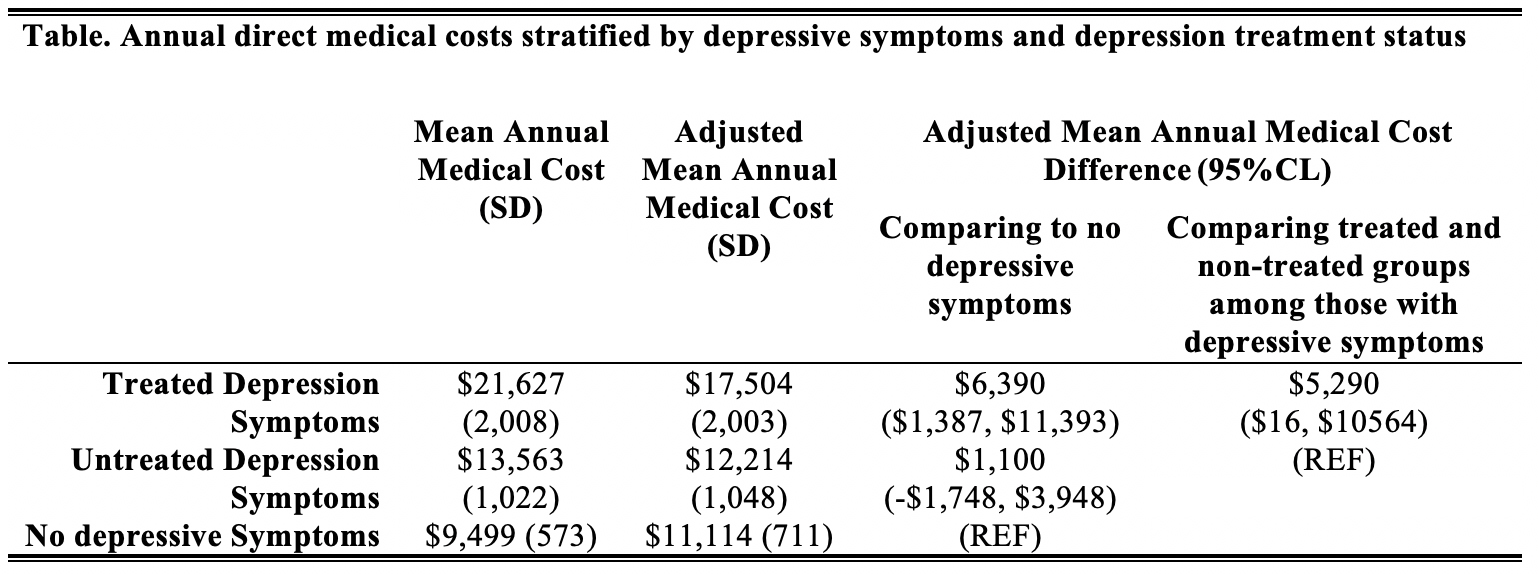Session Information
Session Type: Poster Session B
Session Time: 9:00AM-11:00AM
Background/Purpose: Depressive symptoms are prevalent among knee OA (KOA) patients and likely lead to additional medical costs. We sought to quantify the prevalence of depressive symptoms among Medicare Beneficiaries with KOA and patterns of depression treatment in this population. We compared annual direct medical costs in KOA Medicare beneficiaries with and without depressive symptoms.
Methods: We identified a Knee Osteoarthritis (KOA) cohort using Medicare Current Beneficiary Survey (MCBS) Cost and Use files (2009-2015) among community-dwelling Medicare survey responders who had at least one outpatient visit resulting in Medicare Part A or Part B claims. We used ICD-9/10 diagnostic codes in both Part A and Part B claims to identify KOA cohort. We determined the prevalence of depressive symptoms using self-reported data on sadness or anhedonia during the past year, consistent with DSM-IV criteria. We divided KOA patients into three groups: 1. No reported depressive symptoms; 2. Reported depressive symptoms, no depression-related treatments costs; 3. Reported depressive symptoms and depression-related treatment costs. We ascertained claim payments to physician/suppliers, hospitals, outpatients, skilled nursing facilities, hospice, durable medical equipment, and home health agency. We used these payment data to estimate direct medical costs for each of three groups. We used a generalized linear model to compare mean annual total direct medical cost across three groups, adjusting for general health, comorbid conditions, year of MCBS, and interaction of MCBS year with depressive symptoms/treatment.
Results: We identified 1,918 individuals with KOA. 28% self-reported depressive symptoms and 5% received depression-related billable medical services. The mean adjusted annual direct medical cost ranged from $11,114 for Medicare beneficiaries with KOA without depressive symptoms, to $12,214 among those with KOA and depressive symptoms who did not accrue depression treatment related costs to $17,504 among those with KOA and depressive symptoms who received depression-related treatment (Table). Subjects with depressive symptoms who were treated had $5,290 (43%) higher direct medical cost compared to those with depressive symptoms who were not treated and $6,390 (57%) higher direct medical costs compared to those without depressive symptoms.
Conclusion: Over one quarter of Medicare beneficiaries with KOA self-reported depressive symptoms but just 5% of the population received treatment for depression. The presence of depressive symptoms leads to higher direct medical costs that are somewhat attenuated after accounting for other medical comorbidities.
To cite this abstract in AMA style:
Song S, Katz J, Losina E. Impact of Depressive Symptoms, Anti-depression Treatment on Direct Medical Costs Among Medicare Beneficiaries with Knee Osteoarthritis (KOA) [abstract]. Arthritis Rheumatol. 2020; 72 (suppl 10). https://acrabstracts.org/abstract/impact-of-depressive-symptoms-anti-depression-treatment-on-direct-medical-costs-among-medicare-beneficiaries-with-knee-osteoarthritis-koa/. Accessed .« Back to ACR Convergence 2020
ACR Meeting Abstracts - https://acrabstracts.org/abstract/impact-of-depressive-symptoms-anti-depression-treatment-on-direct-medical-costs-among-medicare-beneficiaries-with-knee-osteoarthritis-koa/

